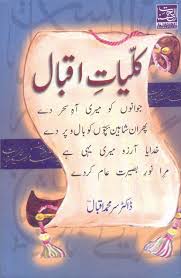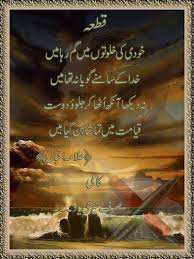Urdu Poetry Iqbal Biography
Source (google.com.pk)
Sir Muhammad Iqbal (November 9, 1877 – April 21, 1938), also known as Allama Iqbal, was a philosopher, poet and politician[1] in British India who is widely regarded as having inspired the Pakistan Movement. He is considered one of the most important figures in Urdu literature, with literary work in both the Urdu and Persian languages.
Iqbal is admired as a prominent classical poet by Pakistani, Indian, Iranian, and other international scholars of literature. Though Iqbal is best known as an eminent poet, he is also a highly acclaimed "Muslim philosophical thinker of modern times". His first poetry book, Asrar-e-Khudi, appeared in the Persian language in 1915, and other books of poetry include Rumuz-i-Bekhudi, Payam-i-Mashriq and Zabur-i-Ajam. Amongst these his best known Urdu works are Bang-i-Dara, Bal-i-Jibril, Zarb-i Kalim and a part of Armughan-e-Hijaz. In Iran and Afghanistan, he is famous as Iqbal-e Lahori (Iqbal of Lahore), and he is most appreciated for his Persian work. Along with his Urdu and Persian poetry, his various Urdu and English lectures and letters have been very influential in cultural, social, religious and political disputes over the years.
In 1922, he was knighted by King George V, giving him the title "Sir".
While studying law and philosophy in England, Iqbal became a member of the London branch of the All India Muslim League. Later, in one of his most famous speeches, Iqbal pushed for the creation of a Muslim state in Northwest India. This took place in his presidential speech in the League's December 1930 session. He was very close to the founder of Pakistan, Mohammad Ali Jinnah.
In much of Southern Asia and Urdu speaking world, Iqbal is regarded as the Shair-e-Mashriq ("Poet of the East"). He is also called Muffakir-e-Pakistan ("The Thinker of Pakistan") and Hakeem-ul-Ummat ("The Sage of the Ummah"). The Pakistan government officially named him a "national poet". His birthday Yom-e Weladat-e Mu?ammad Iqbal (Iqbal Day) is a public holiday in Pakistan. In India he is also remembered as the author of the popular song Saare Jahaan Se Achcha
Iqbal was influenced by the teachings of Sir Thomas Arnold, his philosophy teacher at Government college Lahore, Arnold's teachings determined Iqbal to pursue higher education in the West. In 1905, he traveled to England for his higher education. Iqbal qualified for a scholarship from Trinity College in Cambridge and obtained Bachelor of Arts in 1906, and in the same year he was called to the bar as a barrister from Lincoln's Inn. In 1907, Iqbal moved to Germany to study doctorate and earned PhD degree from the Ludwig Maximilian University, Munich in 1908. Working under the guidance of Friedrich Hommel, Iqbal published his doctoral thesis in 1908 entitled: The Development of Metaphysics in Persia.
During Iqbal's stay in Heidelberg, Germany in 1907 his German teacher Emma Wegenast taught him about Goethe's Faust, Heine and Nietzsche. During his study in Europe, Iqbal began to write poetry in Persian. He prioritized it because he believed he had found an easy way to express his thoughts. He would write continuously in Persian throughout his life.
Iqbal is commemorated widely in Pakistan, where he is regarded as the ideological founder of the state. His Tarana-e-Hind is a song that is widely used in India as a patriotic song speaking of communal harmony. His birthday is annually commemorated in Pakistan as Iqbal Day, a national holiday. Iqbal is the namesake of many public institutions, including the Allama Iqbal Campus Punjab University in Lahore, the Allama Iqbal Medical College in Lahore, Iqbal Stadium in Faisalabad, Allama Iqbal Open University in Pakistan, the Allama Iqbal International Airport in Lahore, the Allama Iqbal hall in Nishtar Medical College in Multan and Gulshan-e-Iqbal Town in Karachi and Allama Iqbal Hall at AMU, India.
The government and public organizations have sponsored the establishment of educational institutions, colleges and schools dedicated to Iqbal, and have established the Iqbal Academy to research, teach and preserve the works, literature and philosophy of Iqbal. Allama Iqbal Stamps Society established for the promotion of Iqbaliyat in philately and in other hobbies. His son Javid Iqbal has served as a justice on the Supreme Court of Pakistan. Javaid Manzil was the last residence of Allama Iqbal.
Keh Do Gham-E- Husain Manany Walon Ko
Momin Kbhi Shaheed Ka Matam Nhi Krte
Hy Ishq Apni Jan Se Zyada Aal-E-Rasol Se
Yun Sar-E-Aam Hum Unka Tamasha Nai Krty
Roein Wo Jo Munkir Hain Shahadat-E-HUSSAIN K
Hum Zinda-O-Javaid Ka Matam Nahi Kertay
-----------------------
Phool Ki Patti Sy Cut Sakta He Heeray Ka Jigar
Kalam E Narm O Nazuk Mard E Nadan Pr By Asar
-----------------------
Hazaar Chasma Tara Rahay Sing Say Photay
Khudi Ma Doub Ker Zerb.E.Kaleem Pada Ker
-----------------------
100, 100 Umeed Bandhati Hai Ik Ik Nigha Par
Mujh Ko Nah Esy Payar Se Dekha Kary Koi
Halki C Chahb Dikha K Aap To Pardy Main Ho Rahy
Or Keh Gaye Nigah Ko Dhoondha Kary Koi
Iqbal Tery Ishq Ne Sab Ball Diye Nikaal
Mudat Se Arzu The Seedha Kary Koi
-----------------------
Khudi Ko Kr Buland Itna K Har Takder Se Pehlay
Khuda Banday Se Khud Pochay Bta Teri Raza Kya Hai
-----------------------
Urdu Poetry Iqbal


Urdu Poetry Iqbal


Urdu Poetry Iqbal

Urdu Poetry Iqbal


Urdu Poetry Iqbal


Urdu Poetry Iqbal

Urdu Poetry Iqbal


Urdu Poetry Iqbal


Urdu Poetry Iqbal


Urdu Poetry Iqbal


Urdu Poetry Iqbal
No comments:
Post a Comment